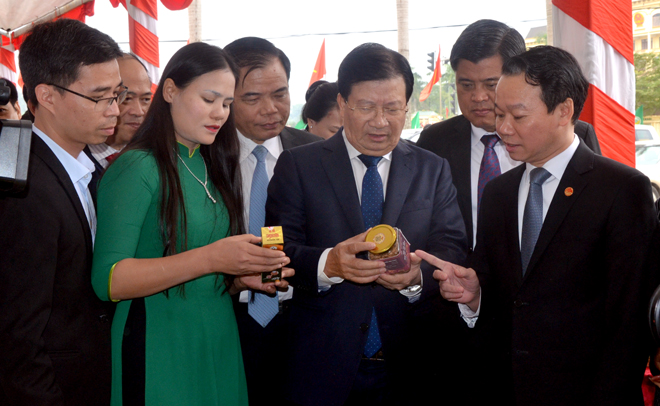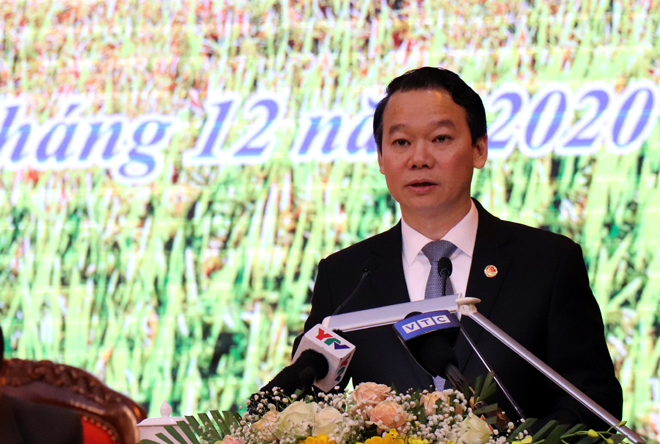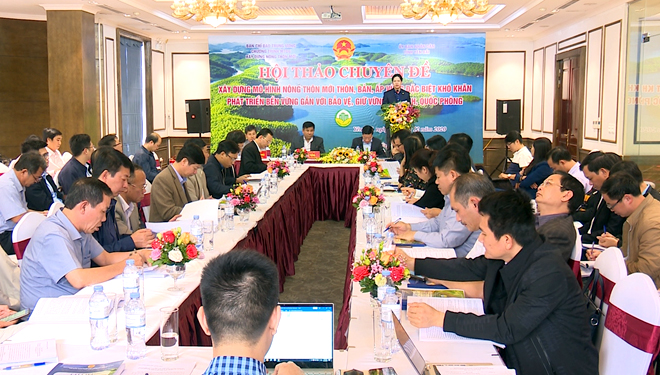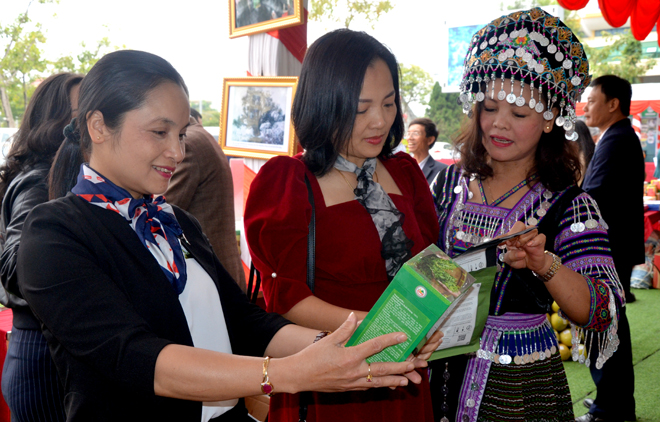New-style rural area building programe in extremely difficult regions reviewed
- Tuesday, December 8, 2020
YênBái - The northern province of Yen Bai on December 3 hosted a national conference to review the implementation of the new-style rural area building programme in regions with extreme difficulties in the 2016-2020 period and draw out orientations for the 2021-2025 period.

|
|
Deputy Prime Minister Trinh Dinh Dung and leaders of ministries, sectors and Yen Bai visit booths introducing OCOP products of provinces.
|
The event was chaired by Deputy Prime Minister Trinh Dinh Dung, who is head of the Central Steering Committee on National Target Programme on New-Style Rural Area Building for 2016-2020.
Addressing the event, Secretary of the Yen Bai Party Committee Do Duc Duy said that in the 2016-2020 period, Yen Bai has recorded positive results in restructuring the agricultural sector in combination with new-style rural area building and sustainable poverty reduction.
The agro-forestry-fisheries sector posted an annual growth of 4.5 percent, while the ratio of households escaping poverty reduced by 5 percent each year. The living conditions of rural residents have been improved, with average income rising 1.5 times over five years ago. At the end of 2020, Yen Bai will have 76 out of its total 150 communes completing the new-style rural area programme, including 12 extremely difficult communes.

Secretary of the Yen Bai Party Committee Do Duc Duy delivers a welcome speech at the opening of the conference.
Duy attributed the results to the efficiency of communication work that has fundamentally changed the mindset of locals, especially those of ethnic minority groups, along with the mobilisation of the strength of the great national solidarity bloc and the engagement of the whole political system, as well as the contributions of local residents.
Yen Bai will strive to have 46 more communes, mostly extremely difficult ones, to be recognised as new-style rural areas, together with 30 percent of the total communes completing criteria of advanced new-style rural areas, and two new-style rural districts.
On national scale, eight out of 64 poor districts nationwide have been put out of the list of extremely difficult localities, and 14 out of 30 poor districts have risen above the poverty status. But none of them have been recognized as new-style rural area.
At the same time, 315 out of 2,430 communes in extreme difficulties nationwide have been recognized as new-style rural areas, equivalent to 13 percent.
Total investment for the programme in the past five years amounted to nearly 792 trillion VND, 4.4 percent of which is contributed by the community.
About 80 percent of the communes and over 70 percent of the villages now have concrete roads to their centre. Meanwhile, 100 percent of communes and 97.8 percent of the villages have been connected to the national power grid. Irrigation works have met 75-80 percent of locals’ farming demands. All communes have primary and junior high schools, while 99.5 percent of the communes have health care stations, 58.6 percent of the communes have cultural houses, and 78.7 percent of villages have cultural and community houses.

Within the conference’s framework, a thematic conference is held on building the model of new-style rural areas in villages facing extreme difficulties towards sustainable development in combination with defence-security protection.
Concluding the conference, Deputy PM Trinh Dinh Dung affirmed that with the joint efforts of the whole political system and people across the country, after 10 years of implementing, the National Target Programme on New-Style Rural Area Building have reaped great, comprehensive achievements of historical significance.
He asked the Ministry of Agriculture and Rural Development to focus on reviewing all regional and provincial planning to strengthen connectivity in transport infrastructure, while looking back on the planning on new-style rural area building.
Localities should speed up the construction of fundamental infrastructure under the new-style rural area building programme, he said, stressing the need for economic restructuring based on the real situation in each region and locality, creating a favourable environment to attract more investment to extremely difficult regions as well as mountainous and island areas.

Delegates visit pavilions introducing OCOP products of Yen Bai.
At the same time, it is necessary to enhance the efficiency of cooperatives in those areas to develop trade villages, OCOP products, prioritise education and vocational training to improve the quality of human resources, and invest in health care services.
He also stressed environmental protection and the maintenance of defence and security, as well as the enhancement of the role of the Vietnam Fatherland Front, socio-political organisations and prestigious figures in the community, so as to speed up the progress of new-style rural area building work.
Toan Van Cuong